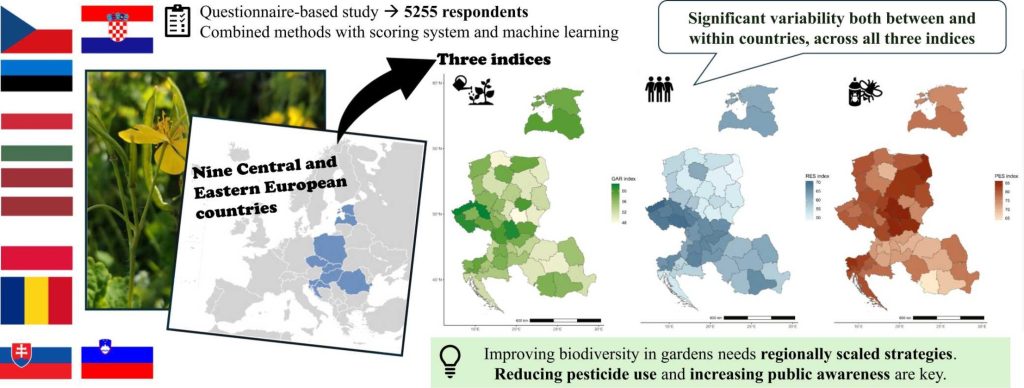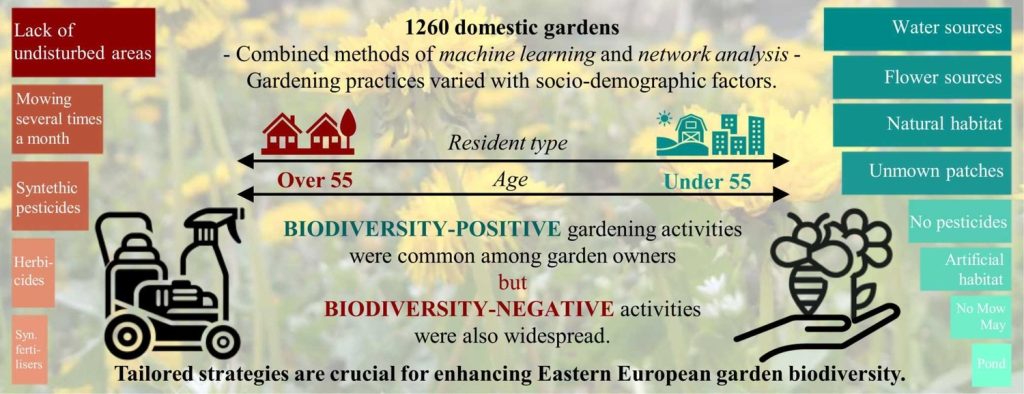Surveys on gardens’ potential and gardeners’ attitudes toward supporting high biodiversity in nine European countries
In times of global biodiversity loss, urban green areas, like private gardens and allotments, play increasingly important role in supporting insects. These gardens can be biodiversity hotspots or act as stepping stones for wildlife in a network of connected semi-natural patches. Ecologically minded garden designs and management can offer food sources and habitat refuges for insects, which positively affect their abundance and diversity. However, even though garden layout and location could increase diversity, garden use, and management often hinder those benefits.
Thanks to widespread modern technologies, data on garden biodiversity can easily and quickly be collected through citizen science projects, but our understanding on how garden layout, location, and management influence this biodiversity is still limited. It is now well-known that the attitude of garden owners toward a diverse garden is a key when the current and potential biodiversity values of the gardens are to be protected. For this, it is crucial to be aware of the motivations of gardeners and to recognise their attitude towards learning about and protecting biodiversity. Indeed, exploring, maintaining, or even improving garden diversity is a multi-faceted issue that needs the cooperation of gardeners, their understanding of the importance of decreased pesticide use, and the maintaining of the structural diversity of their gardens.
Main aim of our research
To expand our current knowledge on the potential of gardens and the attitudes of their garden owners towards supporting and maintaining high biodiversity across nine European countries.
Significance of our research
Our research is pioneering in that it gathers data from historically and culturally related nine countries of the European Union, from which such data are scarce. The significance of this research is that it amalgamates information of high conservation value and societal interest, from the central, eastern, and northern parts of Europe, where societies are traditionally less environmentally conscious than their western counterparts.
Our study opens up new perspectives on understanding the complex relationships between garden characteristics, practices of gardeners, and garden biodiversity. Our complex scoring system used to process the results serves as a proxy for indicating gardens’ potential for maintaining high biodiversity and assessing their possible role in designing eco-networks of biodiversity-friendly gardens with high conservation value. It also lays the groundwork for future research investigating the sociological drivers of gardening in Central and Eastern Europe.
We circulated an extensive online questionnaire among garden owners in ten languages in nine countries across Central and Eastern Europe, between 2022 and 2023. The participating countries were Croatia, Czechia, Estonia, Hungary, Latvia, Poland, Romania, Slovakia, and Slovenia.
Within the framework of our research, three scientific papers have been published to date. Our first questionnaire was completed by a total of 463 respondents from Hungary, while our second survey received 5255 responses from garden owners across nine countries.

I) Plant growers’ environmental consciousness may not be enough to mitigate pollinator declines: a questionnaire-based case study in Hungary (2022)
- The use of pesticides proved to be much more widespread among both agricultural producers and gardeners in Hungary than initially anticipated.
- Our results suggest that pollinator-friendly gardens may act as ecological traps, as pollen- and nectar-rich plants attract pollinators (and other insects) to areas where pesticide residues can cause acute poisoning and sublethal effects.
II) Bridging biodiversity and gardening: Unravelling the interplay of socio-demographic factors, garden practices, and garden characteristics (2024)
- Among gardeners in Hungary, biodiversity-positive activities – such as promoting pollinators – are widespread, particularly among middle-aged gardeners. However, biodiversity-negative practices – including the lack of undisturbed areas, frequent mowing, and the excessive use of pesticides – remain common.
- Biodiversity-friendly practices are especially rare among garden owners over the age of 55, those with long-term gardening experience, and those who follow traditional gardening practices.
- Garden owners living in small towns tend to pay less attention to sustainable and biodiversity-friendly gardening practices than their counterparts in large cities or rural areas.
- The examined gardening variables and garden characteristics revealed a network of positive and negative associations, allowing us to classify gardens into four groups. One such group includes gardens primarily focused on food production; another comprises ornamental gardens, which mainly serve an aesthetic purpose based on the plant types present; and a further category encompasses gardens where the support of biodiversity takes precedence over productive or ornamental functions.
III) Improving biodiversity in Central and Eastern European gardens needs regionally scaled strategies (2025)
- The potential for fostering high biodiversity and value of gardens in Central and Eastern Europe show substantial regional variation, both between participating countries and within countries, at smaller and larger spatial scales.
- The use of pesticides is widespread (average 52.60% of gardeners; lowest in Slovakia at 38.88%, highest in Romania at 69.59%), and socio-demographic factors have little influence or predictive power.
- Spending more time gardening is associated with both higher pesticide use and greater garden biodiversity potential.
- Garden owners over 55 years of age are generally more likely to adhere to traditional practices.

Scientific papers
Varga-Szilay, Z., Barsevskis, A., Benedek, K., Bevk, D., Jojczyk, A., Kristin, A., Ruzickova, J., Jelaska, L. S., Veromann, E., Vilumets, S., Fetyko, K., Szovenyi, G., & Pozsgai, G. (2025). Improving biodiversity in Central and Eastern European gardens needs regionally scaled strategies. Urban Forestry & Urban Greening, 113(129074).
Varga-Szilay, Z., Fetyko, K. G., Szovenyi, G., & Pozsgai, G. (2024). Bridging biodiversity and gardening: Unravelling the interplay of socio-demographic factors, garden practices, and garden characteristics. Urban Forestry & Urban Greening, 97(128367).
Varga-Szilay, Z., & Pozsgai, G. (2022). Plant growers’ environmental consciousness may not be enough to mitigate pollinator declines: a questionnaire-based case study in Hungary. Pest Management Science, 79(4), 1284–1294.
Conferences
Varga-Szilay, Z., Barševskis, A., Benedek, K., Jojczyk, A., Krištín, A., Růžičková, J., Šerić Jelaska, L., Veromann, E., Vilumets, S., Szövényi, G., & Pozsgai, G. (2024). Kertészkedés Közép- és Kelet-Európában a globális biodiverzitás csökkenés korában. I. Rovartani Konferencia, Budapest, Hungary.
Varga-Szilay, Z., Arvīds, B., Benedek, K., Bevk, D., Jojczyk, A., Krištín, A., Růžičková, J., Jelaska, L. S., Veromann, E., Vilumets, S., Fetykó, K. G., Szövényi, G., & Pozsgai, G. (2024). Improving biodiversity in Central and Eastern European (CEE) domestic gardens needs regionally scaled strategies. Royal Entomological Society ENTO24, online.
Varga-Szilay, Z., Benedek, K., Fetykó, K. G., Szövényi, G., & Pozsgai, G. (2024). Home gardening duality: Pollinator-friendly practices amidst widespread pesticide use. 24. Kolozsvári Biológus Napok.
Varga-Szilay, Z., Fetykó, K. G., Szövényi, G., & Pozsgai, G. (2024). Gardening for pollinators? Unveiling garden owners’ awareness and their pollinator-friendly practices. Royal Entomological Society (RES) Student Forum 2024.
Varga-Szilay, Z. (2021). Safe heavens or poisonous traps: pesticide use in bee-friendly gardens. Royal Entomological Society ENTO’21, online.


